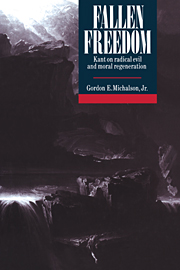2 - Kant's definition of moral evil
Published online by Cambridge University Press: 15 December 2009
Summary
When the will abandons the higher, and turns to what is lower, it becomes evil – not because that is evil to which it turns, but because the turning is perverse.
St. AugustineNo one can say with certainty why this man becomes good, that man evil.
KantOverview
Kant claims that moral evil is the subordination, within a maxim, of the incentive of moral duty to the incentive of sensuous inclination or “self-love” (p. 36; p. 31). He further claims that radical evil is the freely-willed choice of an evil “ground” of maxim-making that results in the subordination of the moral incentive to the sensuous as a regular, ongoing policy in one's successive acts of maxim-making (p. 37; p. 32). He develops these claims in the context of a sort of contest within human nature between what he calls an “original predisposition to good” and a “natural propensity to evil,” a set of terms that embodies the insight that, for Kant, the “human will is the locus of countervailing incentives, the ordering of which constitutes the moral ‘self.’” Indeed, Religion within the Limits of Reason Alone is structured in large part in a manner designed to play out what Kant calls the “conflict of the good with the evil principle for sovereignty over man,” leading eventually to the “victory of the good over the evil principle” – with these two expressions serving, in fact, as the titles of Books Two and Three of the Religion (pp. 57, 93; pp.50, 85).
- Type
- Chapter
- Information
- Fallen FreedomKant on Radical Evil and Moral Regeneration, pp. 30 - 51Publisher: Cambridge University PressPrint publication year: 1990

